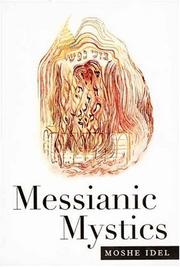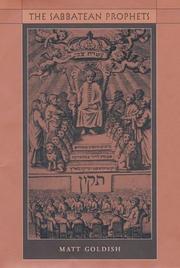| Listing 1 - 7 of 7 |
Sort by
|
Book
ISBN: 9789004136021 9004136029 9789004279209 9004279202 1322127751 9781322127750 Year: 2014 Volume: 90 Publisher: Leiden
Abstract | Keywords | Export | Availability | Bookmark
 Loading...
Loading...Choose an application
- Reference Manager
- EndNote
- RefWorks (Direct export to RefWorks)
This is a new and revised edition of the book first published 1980. It contains new introductory and concluding chapters as well as a Bibliography and updated Index. Furthermore, substantial corrections, updates, and changes have been made in the original text. The changes concern matters of language and style, they nuance the line of argumentation, and they update the discussion of major issues. The new chapters fill several scholarly gaps that have opened since the initial publication of this book in 1980. The new Introductory Chapter explores new venues and issues in the study and assessment of the Hekhalot literature and relevant passages in apocalyptic literature, and this in light of epistemological and ontological considerations. The Concluding Chapter discusses the ritual praxis of the experience of the Hekhalot mystics and its affitnity to magic, and this in terms of new approaches to ritual theory.
Throne of God. --- 296*64 --- God --- Merkava --- Joods messianisme en apocalyptiek --- Throne --- 296*64 Joods messianisme en apocalyptiek --- Throne of God --- Mysticism --- Apocalyptic literature. --- Literature, Apocalyptic --- Literature --- Judaism.

ISBN: 0585361118 9780585361116 9780300145533 0300145535 0300068409 0300082886 9780300068405 0300068409 Year: 1998 Publisher: New Haven Yale University Press
Abstract | Keywords | Export | Availability | Bookmark
 Loading...
Loading...Choose an application
- Reference Manager
- EndNote
- RefWorks (Direct export to RefWorks)
In this stimulating book, one of the world's leading scholars of Jewish thought examines the long tradition of Jewish messianism and mystical experience. Moshe Idel calls upon his profound knowledge of ancient and medieval texts and of Jewish, Christian, Islamic, and Eastern sources to uncover new perspectives on the nature and development of Jewish messianism. He shows that, contrary to Gershom Scholem's view that mysticism and messianism are incompatible religious tendencies, they are in fact closely related spiritual phenomena. Messianism regularly emerges from mystical experiences, Idel contends.Exploring the interplay of Jewish messianism and mysticism from the twelfth through the eighteenth centuries, the book looks closely at pivotal figures and movements, including Abraham Abulafia, Sabbatai Sevi, and hasidism. Idel discerns three types of messianism-theosophical-theurgical, ecstatic, and talismanic-and through these demonstrates that Kabbalah, from the very beginning, was messianically oriented. He counters the common belief that messianism typically arises as a response to such calamities as the expulsion of the Jews from Spain in 1492 and shows that messiahs often gain great popularity in times of political tranquility. Idel also finds that Jewish messianic and mystical experience bears a much greater resemblance to Christian messianism than has been recognized before.
296*64 --- Joods messianisme en apocalyptiek --- 296*64 Joods messianisme en apocalyptiek --- Messiah --- Cabala --- Religion --- Philosophy & Religion --- Judaism --- History of doctrines --- History --- History. --- History of doctrines.
Book
ISBN: 9781139224901 1139224905 9781139221474 1139221477 1280485442 9781280485442 9781139084819 113908481X 9781107017924 1107017920 9781139218382 9781107662315 1107230810 1139210173 1139223186 9786613580429 1139218387 1139215299 1107662311 Year: 2012 Publisher: Cambridge ; New York : Cambridge University Press,
Abstract | Keywords | Export | Availability | Bookmark
 Loading...
Loading...Choose an application
- Reference Manager
- EndNote
- RefWorks (Direct export to RefWorks)
Belief in the coming of a Messiah poses a genuine dilemma. From a Jewish perspective, the historical record is overwhelmingly against it. If, despite all the tragedies that have befallen the Jewish people, no legitimate Messiah has come forward, has the belief not been shown to be groundless? Yet for all the problems associated with messianism, the historical record also shows it is an idea with enormous staying power. The prayer book mentions it on page after page. The great Jewish philosophers all wrote about it. Secular thinkers in the twentieth century returned to it and reformulated it. And victims of the Holocaust invoked it in the last few minutes of their life. This book examines the staying power of messianism and formulates it in a way that retains its redemptive force without succumbing to mythology.
Despair --- Messiah --- Redemption --- 296*64 --- Redemption (Jewish theology) --- Judaism --- Hopelessness --- Loss of hope --- Emotions --- Hopelessness theory of depression --- 296*64 Joods messianisme en apocalyptiek --- Joods messianisme en apocalyptiek --- Religious aspects&delete& --- Doctrines --- Judaism. --- Religious aspects --- Arts and Humanities --- Religion
Book
ISBN: 9004059598 9004332677 0585334145 9780585334141 9789004332676 9789004059597 Year: 1980 Volume: Bd. 14 Publisher: Leiden E.J. Brill
Abstract | Keywords | Export | Availability | Bookmark
 Loading...
Loading...Choose an application
- Reference Manager
- EndNote
- RefWorks (Direct export to RefWorks)
Mysticism --- Apocalyptic literature --- Throne of God --- Judaism --- 296*64 --- -Apocalyptic literature --- God --- Merkava --- Literature, Apocalyptic --- Literature --- 296*64 Joods messianisme en apocalyptiek --- Joods messianisme en apocalyptiek --- Dark night of the soul --- Mystical theology --- Theology, Mystical --- Spiritual life --- Negative theology --- Throne --- Apocalyptic literature. --- Throne of God. --- Judaism.
Book
ISBN: 9789042038332 9789401210782 9042038330 9401210780 Year: 2014 Publisher: Amsterdam New York Editions Rodopi
Abstract | Keywords | Export | Availability | Bookmark
 Loading...
Loading...Choose an application
- Reference Manager
- EndNote
- RefWorks (Direct export to RefWorks)
In response to the grim realities of the present world Jewish thought has not tended to retreat into eschatological fantasy, but rather to project utopian visions precisely on to the present moment, envisioning redemptions that are concrete, immanent, and necessarily political in nature. In difficult times and through shifting historical contexts, the messianic hope in the Jewish tradition has functioned as a political vision: the dream of a peaceful kingdom, of a country to return to, or of a leader who will administer justice among the nations. Against this background, it is unsurprising that Jewish messianism in modern times has been transposed, and lives on in secular political movements and ideologies. The purpose of this book is to contribute to the deeper understanding of the relationship between Jewish thought, utopia, and revolution, by taking a fresh look at its historical and religious roots. We approach the issue from several perspectives, with differences of opinion presented both in regard to what Jewish tradition is, and how to regard utopia and revolution. These notions are multifaceted, comprising aspects such as political messianism, religious renewal, Zionism, and different forms of Marxist and Anarchistic movements.
296*64 --- 296*64 Joods messianisme en apocalyptiek --- Joods messianisme en apocalyptiek --- Jewish philosophy --- Utopias --- Philosophie juive --- Utopies --- Congresses. --- Congrès --- Jewish philosophy. --- Utopias. --- Ideal states --- States, Ideal --- Utopian literature --- Political science --- Socialism --- Voyages, Imaginary --- Dystopias --- Philosophy, Modern. --- Modern philosophy --- Jews --- Philosophy, Jewish --- Philosophy, Israeli --- Philosophy
Book
ISBN: 1139064169 1107222087 1280775904 1139076671 9786613686299 1139081225 1139070959 113907895X 113908349X 0511920547 9780511920547 9781139083492 9781139081221 9781107009080 1107009081 9781107665231 110766523X 9781139078955 9781139064163 9781107222083 9781280775901 9781139076678 6613686298 9781139070959 Year: 2011 Publisher: Cambridge ; New York : Cambridge University Press,
Abstract | Keywords | Export | Availability | Bookmark
 Loading...
Loading...Choose an application
- Reference Manager
- EndNote
- RefWorks (Direct export to RefWorks)
This book explores the influence of Roman imperialism on the development of Messianic themes in Judaism in the fifth through the eight centuries CE. It pays special attention to the ways in which Roman imperial ideology and imperial eschatology influenced Jewish representations of the Messiah and Messianic age. Topics addressed in the book include: representations of the Messianic kingdom of Israel as a successor to the Roman Empire, the theme of imperial renewal in Jewish eschatology and its Roman parallels, representations of the emperor in late antique literature and art and their influence on the representations of the Messiah, the mother of the Messiah in late antique and Byzantine cultural contexts, and the figure of the last Roman Emperor in Christian and Jewish tradition.
Messiah --- Messianic era (Judaism) --- Judaism --- Jews --- Hebrews --- Israelites --- Jewish people --- Jewry --- Judaic people --- Judaists --- Ethnology --- Religious adherents --- Semites --- Religions --- Eschatology, Jewish --- Judaism. --- History --- Civilization --- Roman influences. --- Religion --- Restoration --- Doctrines --- 296 "00/04" --- 296 "04/14" --- 296*64 --- 296*64 Joods messianisme en apocalyptiek --- Joods messianisme en apocalyptiek --- Civilization&delete& --- Roman influences --- Judaïsme. Jodendom--?"00/04" --- Judaïsme. Jodendom--Middeleeuwen --- Messianic era (Judaism). --- Arts and Humanities

ISBN: 0674037758 9780674037755 9780674012912 0674012917 0674012917 Year: 2009 Publisher: Cambridge, MA
Abstract | Keywords | Export | Availability | Bookmark
 Loading...
Loading...Choose an application
- Reference Manager
- EndNote
- RefWorks (Direct export to RefWorks)
Matt Goldish shifts the focus of Sabbatean studies from the theology of Lurianic Kabbalah to the widespread 17th century belief in latter-day prophecy. By placing Sabbateanism in this broad cultural context, Goldish integrates this Jewish messianic movement into the early modern world.
Sabbathaians --- Prophecy --- Messiah --- Forecasting --- Sabbataeans --- Sabbathaists --- Sabbatians --- Shabbathaians --- Shabbethaians --- Cabala --- Jewish sects --- History --- Judaism --- History of doctrines. --- Shabbethai Tzevi, --- Shabbethai Ẓebi, --- Zevi, Sabbatai, --- Sabbataj Zĕwi, --- Sabbatai Zevi, --- Shabthai Tsebi, --- Sevi, Sabatai, --- Sabatai Sevi, --- Shabbetai Tzevi, --- Shabbatai Zevi, --- Zevi, Shabbatai, --- Tzevi, Shabbethai, --- Zebi, Shabbethai, --- Zĕwi, Sabbataj, --- Tsebi, Shabthai, --- Tzevi, Shabbetai, --- Shabbetai Ẓevi, --- Ẓevi, Shabbetai, --- Shabbatai, --- Shabtai Tsevi, --- Tsevi, Shabtai, --- Sabbatai Zebi, --- Zebi, Sabbatai, --- Shabtay Zvi, --- Zvi, Shabtay, --- Sabetha Sebi, --- Sebi, Sabetha, --- Sampatai Tsevi, --- Σαμπατάι Τσεβί, --- Tsevi, Sampatai, --- Τσεβί, Σαμπατάι, --- Șabbatai Țevi, --- Țevi, Șabbatai, --- שבטי צבי --- שבתאי צבי --- שבתאי צבי, --- שבתי --- שבתי צבי --- שבתי צבי, --- שבתי, צבי --- 296*64 --- 296*64 Joods messianisme en apocalyptiek --- Joods messianisme en apocalyptiek --- Judaism&delete& --- History of doctrines
| Listing 1 - 7 of 7 |
Sort by
|

 Search
Search Feedback
Feedback About UniCat
About UniCat  Help
Help News
News